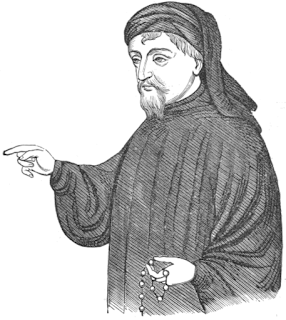The AGe of Chaucer
For our convenience, the life of Chaucer is divided into three periods. The first, of thirty years, includes his youth and early manhood, in which time he was influenced almost exclusively by French literary models. The second period, of fifteen years, covers Chaucer's active life as a diplomat and man of affairs and in this, the Italian influence seems stronger than the French. The third, of fifteen years, generally known as the English period, is the time of Chaucer’s richest development. He lives at home, observes life closely but kindly, and while the French influence is still strong, as shown in “The Canterbury Tales”, he seems to grow more independent of foreign models and is dominated chiefly by the vigorous life of his own English people the works of Chaucer are roughly divided into three classes, corresponding to the three periods of his life. It should be remembered, however, that it is impossible to fix exact dates for most of his works. The best known, though not the best, is a poem of the first period in the “Romaunt of the Rose”, a translation from the French Roman0de la Rose ', the most popular poem of the Middle Ages)- a graceful but! exceedingly tiresome allegory of the whole course of love. The chief work of the second or Italian period in “Troilus and Criseyde; a poem of eight thousand lines. The original story was a favorite of many authors. The middle ages and Shakespeare makes use of it in his “Troilus and Cressida”; Chaucer’s masterpiece “The Canterbury Tales”, one of the most famous works in all literature, fills the third or English period of his life.) Some of his Canterbury Tales were written earlier than the English period and were only grouped with the others in his final arrangement. The plan of the work is magnificent to represent the wide sweep of English life by gathering a motley company together and letting each class of society tells its own favorite stories. Though the great work was never finished, Chaucer succeeded in his purpose. So well that in The Canterbury Tales he has given us a picture of contemporary.
English life, its work and play, its deeds and dreams, its fun and sympathy and the hearty joy of living such as no other single work of literature has ever equaled. Opposite old London, at the southern end of London bridge, once stood the Tabard Inn of Southwark, a quarter made famous not only by the Canterbury Tales but also by the first playhouse where Shakespeare had his training. A number of pilgrims meet at the Tabard Inn where the poet himself is also staying at the time and as he too is going on the same Pilgrimage, he is easily persuaded to join the party. One of the favorite places of Pilgrimage is the shrine of the murdered St. Thomas a Becket at Canterbury and two one the way back: that he himself shall be the judge and that the one who tells the best tale shall be treated by all the rest to supper on their return. The suggestion is warmly only welcomed and the Canterbury Tales is the result. Chaucer has been called the "prince of plagiarists", for he didn’t invent his own tales. Like Shakespeare, he borrowed them from classic, Italian, French, or English sources. But he made them all his won by his manner of narration and in this respect, Chaucer is the supreme storyteller in verse. He has a greater sense of narrative unities and can be more precise and to the point when he likes than any of his contemporaries. His mastery of the art of narration has led many to call him the father of English novels. His Canterbury Tales are so many novels in miniature. There only to be translated into prose to become so many modern novels. That is Why Long has called his prologue to the Canterbury Tales “The prologue to modern fiction”, and s.d. Neil remarks “had Chaucer written in prose, it is possible that his Troilus and Cressyde’ and not Richardson’s ‘Pamela’ would be celebrated as the first English novel”.(Continue)

